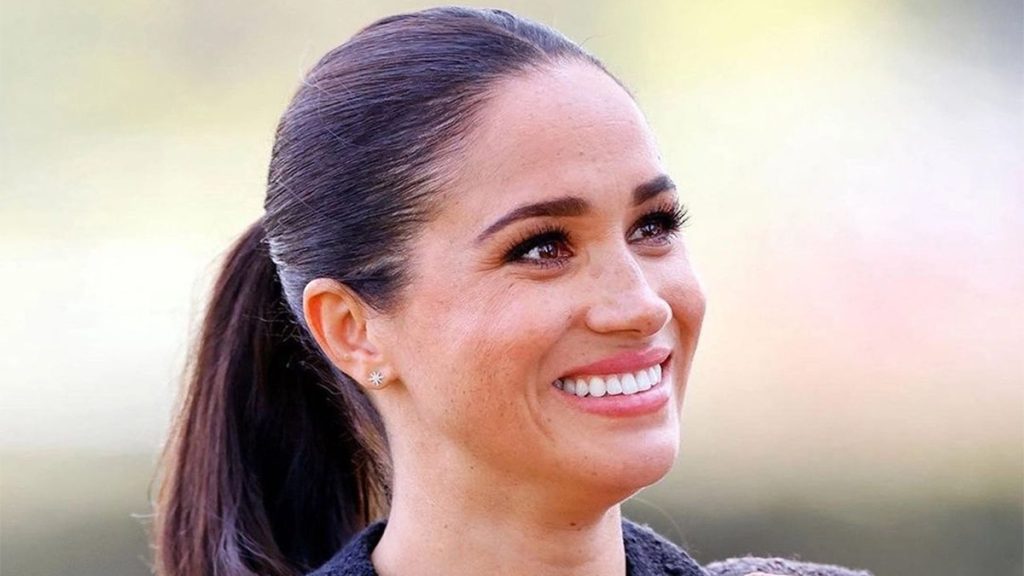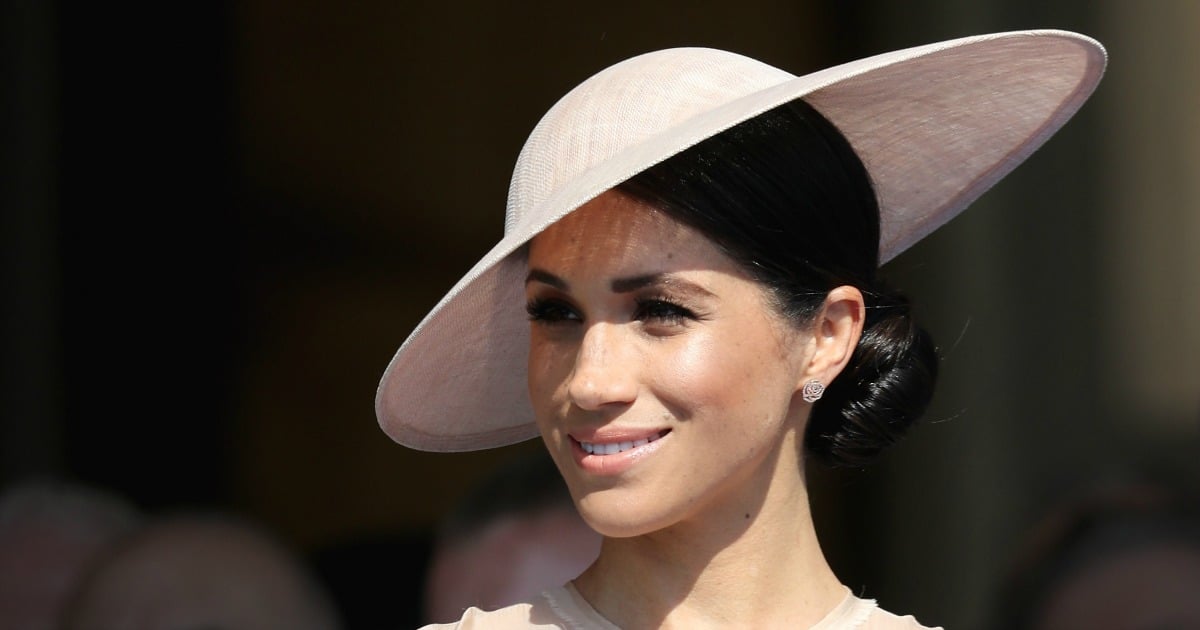Let’s cut to the chase, shall we? Meghan Markle rule 34 is a phrase that’s been making waves in both pop culture circles and privacy discussions. If you haven’t heard about it yet, you’re about to dive into an intriguing world where celebrity life meets the internet’s wild side. Rule 34 itself is a meme-like concept that suggests “if it exists, there’s porn of it.” But when you throw Meghan Markle into the mix, things get a whole lot more complex—and controversial.
Now, before we go any further, let’s be clear: this article isn’t about sensationalizing or spreading misinformation. It’s about understanding the broader implications of how public figures like Meghan Markle navigate the tricky waters of fame, privacy, and the internet’s endless curiosity. So buckle up, because we’re about to explore some heavy topics with a side of wit.
As someone who’s followed Meghan’s journey from actress to royal family member, I can tell you this: her life has always been under a microscope. But the phrase “Meghan Markle rule 34” adds a new layer to the conversation—one that touches on consent, digital ethics, and the boundaries of fandom. Stick around, because this is going to be a ride.
Read also:Are Dave And Kortney Wilson Still Together Heres What Happened
Who Is Meghan Markle, Really? A Quick Bio
Before we dive into the rule 34 aspect, let’s take a moment to remember who Meghan Markle is outside of memes and headlines. Born on August 4, 1981, in Los Angeles, California, Meghan grew up in a diverse family. Her mother, Doria Ragland, is a social worker and yoga instructor, while her father, Thomas Markle, worked as a lighting director for television.
Early Life and Career
Meghan’s journey to fame wasn’t overnight. She started her career as an actress, starring in small roles before landing her big break as Rachel Zane in the hit TV series “Suits.” Beyond acting, Meghan has always been passionate about social justice and humanitarian causes, which she continues to champion today.
Here’s a quick rundown of her key milestones:
- Born and raised in Los Angeles
- Graduated from Northwestern University with degrees in Theatre and International Studies
- Actress, best known for her role in “Suits”
- Became a member of the British royal family in 2018 after marrying Prince Harry
- Advocate for gender equality, mental health awareness, and social justice
Understanding Rule 34: What’s the Deal?
Rule 34 is an internet meme that originated in the early 2000s. It’s often summarized as “if it exists, there’s porn of it.” While it started as a humorous observation about the internet’s vast and sometimes bizarre content, it’s evolved into something more complex. For celebrities like Meghan Markle, rule 34 can represent a darker side of fandom—one where privacy is disregarded and boundaries are blurred.
Why Meghan Markle Rule 34 Matters
When you combine the concept of rule 34 with a public figure like Meghan Markle, it raises serious questions about consent, respect, and the line between admiration and exploitation. Meghan’s journey from actress to duchess has made her a target for all kinds of attention, but not all of it is positive. The phrase “Meghan Markle rule 34” isn’t just about memes; it’s about the broader cultural conversation around how we treat celebrities in the digital age.
Let’s break it down:
Read also:Deidre Hall The Story Behind The Iconic Days Of Our Lives Star
- Rule 34 highlights the internet’s ability to create and share content without consent.
- Celebrities like Meghan Markle face unique challenges when it comes to protecting their privacy.
- The phrase has sparked debates about digital ethics and the responsibilities of fans and creators.
The Intersection of Fame and Privacy
Meghan Markle’s life is a perfect example of the intersection between fame and privacy. As a public figure, she’s constantly in the spotlight, but that doesn’t mean she’s given up her right to privacy. The phrase “Meghan Markle rule 34” shines a light on the tension between fans’ curiosity and celebrities’ need for personal boundaries.
How Fame Affects Privacy
Here’s the thing: being famous doesn’t mean you’ve signed away your right to privacy. Yet, the internet often operates as if that’s the case. Let’s take a look at some of the ways fame impacts privacy:
- Increased media scrutiny
- Unwanted attention from fans and creators
- Difficulty in maintaining personal relationships
- Constant pressure to perform and conform to public expectations
For someone like Meghan, who’s spent years advocating for women’s rights and mental health, the invasion of privacy can feel especially violating. It’s not just about her; it’s about setting a precedent for how we treat all public figures.
The Role of Consent in Digital Content
Consent is a big deal, especially in the digital age. When it comes to “Meghan Markle rule 34,” the conversation inevitably turns to whether or not creating or sharing certain content is ethical. Consent isn’t just a legal concept—it’s a moral one too. Public figures deserve the same respect and autonomy as anyone else.
Why Consent Matters
Here’s why consent should always be at the forefront of our discussions:
- It’s about respecting someone’s autonomy and dignity.
- Without consent, content can quickly become exploitative or harmful.
- It sets a standard for how we treat others in both online and offline spaces.
Meghan has spoken openly about the challenges of fame and the importance of respecting personal boundaries. Her voice adds weight to the conversation, reminding us that even the most famous among us deserve privacy and respect.
Addressing the Controversy
The phrase “Meghan Markle rule 34” isn’t just a catchy headline—it’s a lightning rod for controversy. Some see it as harmless fun, while others view it as a violation of Meghan’s privacy. The truth, as always, lies somewhere in the middle. Let’s unpack the different perspectives:
Proponents of Rule 34
Some fans argue that rule 34 is simply a reflection of the internet’s creative spirit. They see it as a form of expression, albeit one that pushes boundaries. While their intentions may not be malicious, it’s important to recognize the impact of their actions.
Critics of Rule 34
On the other side of the debate are those who argue that rule 34 is inherently exploitative. They believe that creating or sharing content without consent is a violation of basic human rights. This perspective is especially relevant when it comes to public figures like Meghan Markle, whose lives are already heavily scrutinized.
Legal and Ethical Implications
When it comes to “Meghan Markle rule 34,” the legal and ethical implications can’t be ignored. Laws around privacy and consent vary from country to country, but the principles remain the same. Public figures have the right to control how their image and personal information are used. Here are some key points to consider:
- Intellectual property laws protect celebrities’ rights to their own image.
- Consent is a fundamental ethical principle that should guide all content creation.
- Creators and fans have a responsibility to respect public figures’ boundaries.
Meghan’s advocacy work in areas like gender equality and mental health adds another layer to the conversation. She’s not just a celebrity—she’s a leader in her own right. Treating her with respect isn’t just the right thing to do; it’s essential for maintaining the integrity of our digital culture.
The Broader Cultural Conversation
The phrase “Meghan Markle rule 34” is part of a larger conversation about how we treat public figures in the digital age. It’s not just about one person or one meme—it’s about the values we prioritize as a society. Here are some of the key takeaways:
- Privacy is a universal right, not a privilege for the few.
- Fandom should be about admiration, not exploitation.
- The internet has the power to create and share amazing content, but it also has the potential to harm.
Meghan’s story is a powerful reminder of the importance of respecting others’ boundaries, both online and offline. As we navigate the complexities of the digital world, let’s make sure we’re doing so with empathy and integrity.
What Can We Learn from Meghan Markle?
Meghan Markle’s journey offers valuable lessons for all of us. From her advocacy work to her approach to fame, she’s shown that it’s possible to be both a public figure and a private person. Here are a few things we can learn from her:
- Speak up for what you believe in, even when it’s difficult.
- Respect others’ boundaries, just as you’d want them to respect yours.
- Use your platform for good, whether you’re a celebrity or not.
Meghan’s resilience in the face of scrutiny and criticism is inspiring. She’s shown that it’s possible to maintain your integrity and values, even when the world seems determined to tear you down.
Call to Action: Let’s Do Better
As we wrap up this article, I want to leave you with a challenge: let’s do better. Whether you’re a fan, a creator, or just someone scrolling through social media, you have the power to make a difference. Here’s how:
- Respect public figures’ privacy and boundaries.
- Engage in conversations about digital ethics and consent.
- Support creators and content that align with your values.
Meghan Markle rule 34 may have started as a meme, but it’s evolved into a powerful reminder of the importance of respect and empathy in our digital lives. Let’s make sure we’re using our voices and platforms for good.
Final Thoughts
In conclusion, the phrase “Meghan Markle rule 34” is more than just a catchy headline. It’s a reflection of the complex relationship between fame, privacy, and the internet. As we continue to navigate this ever-changing landscape, let’s remember the importance of consent, respect, and empathy. Meghan’s story is a powerful reminder that even the most famous among us deserve to be treated with dignity and respect.
So, what’s next? It’s up to all of us to create a digital culture that values privacy, creativity, and human connection. Let’s make sure we’re doing our part to build a better internet—one that respects and uplifts everyone, from celebrities to everyday people.
Now, it’s your turn. Leave a comment, share this article, or start a conversation with your friends. Together, we can make a difference. And remember: let’s be the change we want to see in the world.
Table of Contents
Who Is Meghan Markle, Really? A Quick Bio
Understanding Rule 34: What’s the Deal?
The Intersection of Fame and Privacy
The Role of Consent in Digital Content
Legal and Ethical Implications
The Broader Cultural Conversation
What Can We Learn from Meghan Markle?


